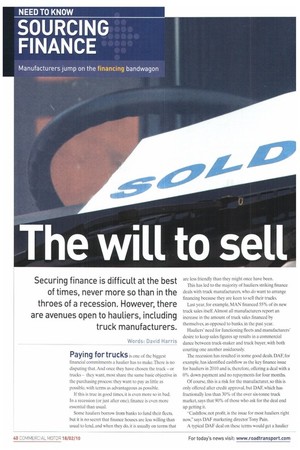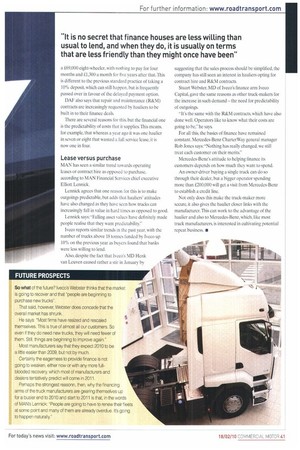The wilt to sell
Page 40

Page 41

If you've noticed an error in this article please click here to report it so we can fix it.
Securing finance is difficult at the best of times, never more so than in the throes of a recession. However, there are avenues open to hauliers, including truck manufacturers.
Words: David Harris Paying for trucks is one of the biggest financial commitments a haulier has to make. There is no disputing that. And once they have chosen the truck — or trucks — they want, most share the same basic objective in the purchasing process: they want to pay as little as possible, with terms as advantageous as possible.
If this is true in good times, it is even more so in bad. In a recession (or just after one), finance is even more essential than usual.
Some hauliers borrow from banks to fund their fleets, but it is no secret that finance houses are less willing than usual to lend, and when they do, it is usually on terms that are less friendly than they might once have been.
This has led to the majority of hauliers striking finance deals with truck manufacturers, who do want to arrange financing because they are keen to sell their trucks Last year, for example, MAN financed 55% of its new truck sales itself. Almost all manufacturers report an increase in the amount of truck sales financed by themselves, as opposed to banks, in the past year.
Hauliers' need for functioning fleets and manufacturers' desire to keep sales figures up results in a commercial dance between truck-maker and truck buyer, with both courting one another assiduously.
The recession has resulted in some good deals. DAF, for example, has identified cashflow as the key finance issue for hauliers in 2010 and is, therefore, offering a deal with a 0% down payment and no repayments for four months.
Of course, this is a risk for the manufacturer, so this is only offered after credit approval, but DAF, which has fractionally less than 30% of the over six-tonne truck market, says that 90% of those who ask for the deal end up getting it.
"Cashflow, not profit, is the issue for most hauliers right now," says DAF marketing director Tony Pain.
A typical DAF deal on these terms would get a haulier a £69,000 eight-wheeler, with nothing to pay for four months and £1,300 a month for five years after that.This is different to the previous standard practice of taking a 10% deposit, which can still happen, but is frequently passed over in favour of the delayed payment option.
DAF also says that repair and maintenance (R&M) contracts are increasingly requested by hauliers to be built in to their finance deals.
There are several reasons for this, but the financial one is the predictability of costs that it supplies. This means. for example, that whereas a year ago it was one haulier in seven or eight that wanted a full service lease, it is now one in four.
Lease versus purchase
MAN has seen a similar trend towards operating leases or contract hire as opposed to purchase, according to MAN Financial Services chief executive Elliott Lennick.
Lennick agrees that one reason for this is to make outgoings predictable, but adds that hauliers' attitudes have also changed as they have seen how trucks can increasingly fall in value in hard times as opposed to good.
Lennick says: "Falling asset values have definitely made people realise that they want predictability" Iveco reports similar trends in the past year, with the number of trucks above 18 tonnes funded by Iveco up 10% on the previous year as buyers found that banks were less willing to lend.
Also, despite the fact that Iveco's MD Henk van Leuven caused rather a stir in January by suggesting that the sales process should be simplified, the company has still seen an interest in hauliers opting for contract hire and R&M contracts.
Stuart Webster, MD of Iveco's finance arm Iveco Capital, gave the same reasons as other truck-makers for the increase in such demand — the need for predictability of outgoings.
"It's the same with the R&M contracts, which have also done well. Operators like to know what their costs are going to be," he says.
For all this, the basics of finance have remained constant. Mercedes-Benz CharterWay general manager Rob Jones says: "Nothing has really changed, we still treat each customer on their merits."
Mercedes-Benz's attitude to helping finance its customers depends on how much they want to spend.
An owner-driver buying a single truck can do so through their dealer, but a bigger operator spending more than £200,000 will get a visit from Mercedes-Benz to establish a credit line.
Not only does this make the truck-maker more secure, it also gives the haulier closer links with the manufacturer. This can work to the advantage of the haulier and also to Mercedes-Benz, which, like most truck manufacturers, is interested in cultivating potential repeat business •
































































































































